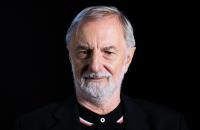I lived all my life as a free man in an illiberal world

Download image
Eugen Brikcius was born in Prague on August 30, 1942. Having graduated of grammar school he was not accepted to university due to a poor cadre assessment. He studied in private philosophy, languages, wrote poetry and took an interest in culture developments. In the late 1960s he started organising happenings in Prague. He organised, for once, a procession of people of whom each person bore a loaf of bread. The State Police perceived his activity as provocation and subversion and sought ways to prevent him from pursuing them. In 1967 he was taken to court over a happening but was freed as the experts appointed by the court defined his event as a piece of art. In 1973 he was sentenced for eight months for singing songs, while drunk, which the court took to be denigration of the Soviet Union, a criminal act under socialism. He worked in the Václav Špála gallery and then on several positions as a labourer. He also made his living as a translator. He was one of the first signatories of Charter 77. A constant pressure from the State Police made him emigrate to Austria in 1980, where he worked in an organisation helping emigrants. He studied philosophy at a university in London. He is an author of many poems, essays and works of art, he has published in several languages, including Latin. Since 1989 he has lived in Czech Republic and Austria.

